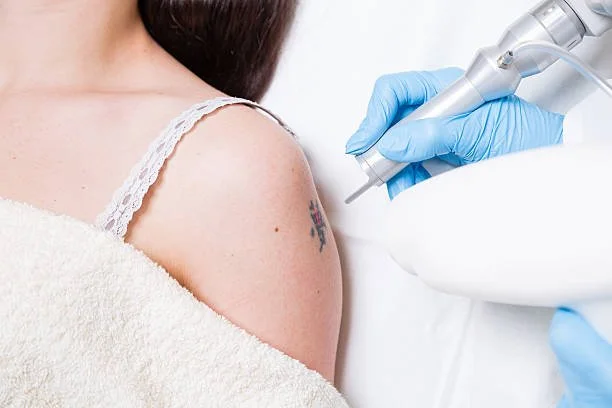

One particular problem to look out for is sun exposure. You may wonder why you need to be careful about it when getting a tattoo removed. We’ll break it down below, so read on to learn more.
Dangers of Sun Exposure During the Tattoo Removal Process
When you start tattoo removal, you are exposing your skin to light energy that is meant to break up the pigment of the tattoo. As the molecules absorb the light, they heat up and destroy the cells where the tattoo is. Since this process is slow, your healthcare provider will tell you to avoid exposing your skin to the sun until it is done.
Professionals will ask you to avoid the sun for at least six weeks before you even start your tattoo removal process. If not, you may have to extend the process and increase skin damage. If you have significant exposure, then your skin is going to be more vulnerable to various issues.
Aside from the sensitivity problems on your skin, the biggest side effect has to do with pigmentation, which we will discuss in the next section.
Pigmentation and Effectiveness of Laser Removal
Not only is the removal process becoming less effective, but you can end up with either hypo- or hyperpigmentation.
Hyperpigmentation looks like skin discoloration, usually darker than the skin tone surrounding it. It is a result of excessive exposure to the sun's UV rays. If you are undergoing tattoo removal, then the whole patch of skin affected may darken significantly compared to other areas of your skin.
Hypopigmentation, on the other hand, results in the skin patch getting much lighter than surrounding areas. Severe instances of this will cause the area to look significantly pale, regardless of your natural skin tone.
Either variation is a possible skin reaction depending on how your body produces melanin. While it's not likely for these effects to leave permanent marks and trauma, they can affect the healing process. They may also look unsightly and take a while to go back to normal.
How Laser Removal Treatment Works
The tattoo removal process is basically the process of breaking down the tattoo ink into smaller molecules, which is subsequently flushed away from the tattooed region by your body's immune system over the course of a few weeks.
In general, you can expect to undergo around six to ten sessions to fully remove your tattoo. Each session will be done at least six weeks apart to allow the skin to heal.
Very dark and extensive tattoos may sometimes take longer to remove, however, it is not impossible with regular removal sessions.
Conclusion
As you can see, the effects of sun exposure after laser tattoo removal can be counterproductive. You may have to increase your number of treatments or simply make sure you protect yourself against the sun. Avoid exposure as much as possible, use sunscreen, and cover up whenever you do have to go outside.
If you’re in need of tattoo removal near Canggu, Bali, check out CleanSlate Laser Clinic. We use world-class certified medical grade equipment in our clinic to provide our clients with a safe and comfortable tattoo removal experience. Book an appointment today!